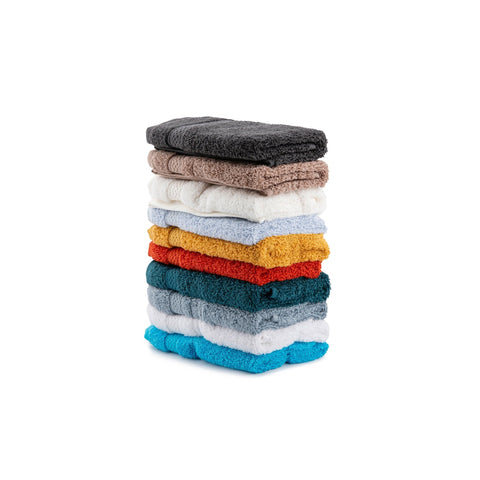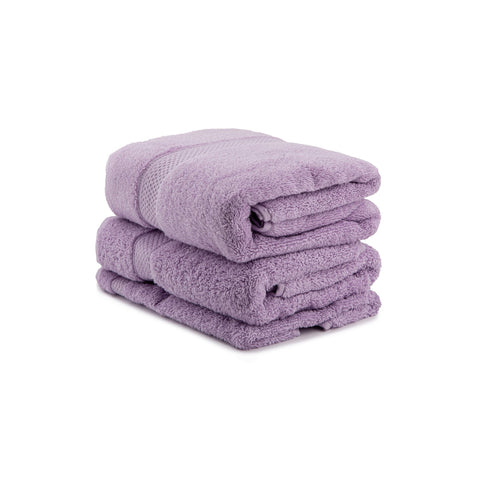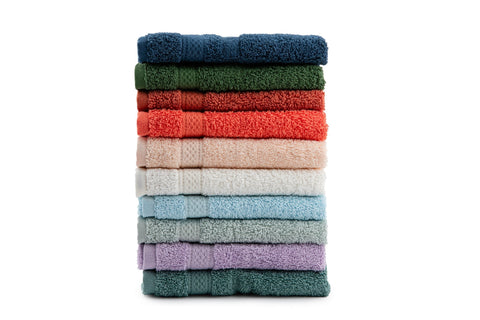Towels are an essential part of our daily lives. We use them at home, during sports, while traveling, and in many other situations where hygiene and comfort play an important role. However, these seemingly simple textiles hide much more than what may first appear. Choosing the right towel can be crucial in how comfortable we feel in our skin day after day. This article aims to help you by showing you the criteria for choosing the perfect towel, whether for home use or for sports.
Materials and weave types
Towels can be made from a variety of materials, each with its own benefits. It's worth considering these characteristics when choosing the one that best suits your individual needs.
- Cotton : Cotton is one of the most commonly used materials for making towels. It is a popular choice due to its excellent absorbency and softness. Cotton towels are particularly durable, allowing for long-term use. These towels are ideal for everyday use as well as for the beach.
- Microfiber : Microfiber towels offer a modern alternative. These materials dry quickly and are extremely lightweight, making them ideal for sports or travel, where quick drying and ease of packing are important considerations.
- Bamboo : Bamboo towels are becoming increasingly popular among eco-conscious shoppers. Their antibacterial properties make them a hygienic choice, and bamboo is incredibly soft and absorbent. Bamboo also grows quickly and requires less water, making it an eco-friendly alternative.
The weave of towels also affects their texture and functionality:
- Terrycloth : This is the most common weave type, consisting of thick loops, giving it excellent moisture absorption. Ideal for use after bathing and at the beach.
- Velour : Velour is a terry cloth with a treated surface where the loops are cut off, making the towel smoother and softer to the touch. It is often used as a decorative towel or in smaller sizes as a hand towel.
- Waffle or wasp pattern : The characteristic lattice pattern of the wasp pattern weave is not only aesthetically appealing, but also promotes faster drying. Perfect for kitchen use and sports.
Weight and density (GSM)
GSM, or grams per square meter, is a measure of the density of fabrics, which is especially important for towels. This value determines how much fabric is contained in a square meter of towel and directly affects the weight, absorbency and durability of the towel.
Why is GSM important?
A higher GSM value generally means a thicker, heavier, and softer towel that absorbs moisture better. Towels with a lower GSM value are lighter, dry faster, and are easy to store or carry.
How does GSM affect the feel and function of a towel?
Towels with a high GSM value are denser, which creates a softer, more luxurious feel and is great for use after a bath. Towels with a lower GSM value, on the other hand, have a lighter texture, making them ideal for use at the gym or when traveling, where quick drying is an advantage.
Recommended GSM values for different types of towels
- Beach Towels : They are usually thicker, ranging in the 400-600 GSM range, to provide a comfortable pad for relaxing on the sand.
- Bath towels : These towels have a high GSM value, typically between 500-700 GSM, as high absorbency is required after bathing.
- Hand towels : Here the GSM value is lower, usually around 300-400 GSM, as frequent use and quick drying are required.
These recommended GSM values will help you find the most suitable towel for your situation, whether it's for home use, the beach or the gym.
Dimensions and function
Towels come in different sizes, and each size has its own specific function. Choosing the right size is key to making sure your towel is as practical as possible for its intended use.
Different sizes of towels and their applications:
- Beach towels : Large in size, often 75x150 cm or larger. They are large, so they provide comfortable relaxation on the sand or on a sun lounger during your vacation .
- Bath towels : Usually about 70x140 cm in size. They are large enough to wrap around the body after bathing.
- Hand towels : Smaller than bath towels, typically measuring 50x100 cm. Ideal for hand washing or minor cleaning tasks.
- Guest towels : These are even smaller, often only 30x50 cm. They are perfect for use in the guest bathroom as they take up little space and can also be decorative.
Tips for choosing the right size:
Consider where and for what purpose you will be using your towel. For the beach, choose a large, comfortable size, while bath towels are best for home use. For guest towels, smaller, more elegant pieces are most appropriate.
Color and design
Choosing the right color and pattern is not only important for aesthetics, but also to ensure it matches the rest of the home's decor.
- The importance of colors and patterns : With colors and patterns, you can easily add a bit of personality and style to the decor of your bathroom or other functional area. Choose colors that harmonize with the environment or are deliberately contrasting to stand out.
- The importance of color fastness : For quality towels, it is important that the colors withstand frequent washing and do not fade easily. Check the product label for color fastness information and choose towels that have particularly good color fastness.
By taking these aspects into account, you can choose towels that are not only functional but also aesthetically appealing, and that will maintain their quality and beauty in the long term.
Maintenance and cleaning
Proper maintenance of towels is key to maintaining their quality and functionality over the long term. The following tips can help you keep your towels in optimal condition.
Tips for properly cleaning towels:
- Always wash new towels before use to increase their absorbency.
- Avoid using fabric softener as it reduces the absorbency of the towels.
- When washing, use a mild detergent and, if possible, dry the towels on a low heat to preserve the softness and elasticity of the fabric.
How does washing habits affect the lifespan of towels?
- Frequent high-temperature washing and drying can shorten the life of towels. Gentle washing and drying methods, such as cold water and air drying, will help preserve the condition of towels.
Sustainability and ethical considerations
Environmentally conscious and ethical purchasing decisions are increasingly important for sustainability.
- Eco-friendly materials and sustainable manufacturing processes : Using bamboo, organic cotton, and recycled materials can significantly reduce your environmental footprint. These materials are produced with less water and energy, and produce fewer emissions.
- Labels and certifications that can help you make sustainable choices : Oeko-Tex, GOTS (Global Organic Textile Standard) and Fair Trade certifications provide assurance that towels are produced under environmentally friendly and ethical conditions.
Choosing the perfect towel is not just about comfort, but there are many other aspects to consider, such as materials, sizes, colors, as well as maintenance and sustainability. We hope this article has helped you see these important aspects more clearly and encourages you to make a conscious and informed decision when purchasing your next towel.

















